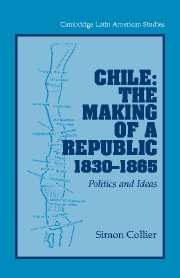Book contents
- Frontmatter
- Contents
- Acknowledgments
- Abbreviations Used in the Notes
- Introduction
- PART I THE NEW REPUBLIC, 1830–1865
- PART II FROM PORTALES TO MONTT, 1835–1851
- 3 Authoritarians and Moderates, 1835–1846
- 4 The Liberal Challenge, 1846–1851
- PART III MID-CENTURY ATTITUDES
- PART IV ORDER AND LIBERTY, 1851–1864
- Sources
- Index
3 - Authoritarians and Moderates, 1835–1846
Published online by Cambridge University Press: 24 July 2009
- Frontmatter
- Contents
- Acknowledgments
- Abbreviations Used in the Notes
- Introduction
- PART I THE NEW REPUBLIC, 1830–1865
- PART II FROM PORTALES TO MONTT, 1835–1851
- 3 Authoritarians and Moderates, 1835–1846
- 4 The Liberal Challenge, 1846–1851
- PART III MID-CENTURY ATTITUDES
- PART IV ORDER AND LIBERTY, 1851–1864
- Sources
- Index
Summary
The Return of Portales
During Diego Portales's first ministry (1830–1), the Conservative regime had consolidated its grip on the new republic. Portales's seventeen months as Interior minister put the stamp of firm government on the country, with Portales assuming an astonishing personal command over his collaborators and the regime itself. How he achieved this will always have an element of the mysterious. Few characters have so fascinated Chilean historians, who have written about him time and time again. Those who have tried to debunk him have usually fallen short of their aim. He obviously had an extraordinary personality – full of nervous energy, in private fun-loving and in public austere, by turns vehement and charming, supremely clear-headed yet also self-deluding: his belief that his true vocation was trade was never borne out by conspicuous business success. He was both loved by his friends and feared by his opponents. Many of his own supporters were jittery about him.
Politically, the record is clear. Portales brooked no opposition from the defeated Liberals, persecuted them, and largely reduced them to silence. He both purged and imposed new standards of order and regularity on the public administration, insisting on such important details as the regular cleaning of government offices, and he successfully beat off all challenges, most of them conspiracies by army officers on the losing side at the Battle of Lircay. By the mid-1830s, the Conservative government had lasted longer than any other since independence, leaving aside the liberator O'Higgins's six-year dictatorship (1817–23).
- Type
- Chapter
- Information
- Chile: The Making of a Republic, 1830–1865Politics and Ideas, pp. 47 - 75Publisher: Cambridge University PressPrint publication year: 2003



